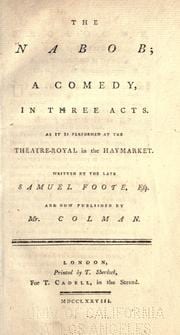 Was Sir Lawrence a ‘Nabob’?
Was Sir Lawrence a ‘Nabob’?
In 1762 Lord Shelburne (1737-1805) informed Henry Fox (1705-1777) that Lawrence ‘Dundas, the Nabob of the North, writes me to desire I’ll get him a baronetcy’.[i] Dundas, on presenting Shelburne with a large ‘loan’, received his title two months later. A baronetcy is the only hereditary honour which is not a peerage. Nobility was a status that the ambitious Sir Lawrence aspired to, but was not to achieve, although his son Thomas did rise to the peerage in 1793. Dundas had been swift to take advantage of his connection with Shelburne, whom he had met in Germany. Shelburne had served in the British army during the Seven Years War, was aide-de-camp to George III and, on the death of his father in 1761 inherited the title and was elevated to the the House of Lords.
An article in the Morning Post in 1775 written by ‘Varro’ provides a contemporary view of Dundas’s rise to prominence, and with it the key points of criticism of ‘new wealth’: political corruption, ostentatious display and infiltration into the aristocracy, Dundas’s only child Thomas had married Lady Charlotte Fitzwilliam, daughter of William Fitzwilliam, 3rd Earl Fitzwilliam in 1764 :
The fortune which this man made by contracts during the war in Germany … has already filled the house of Commons with five of his name, and three or four more who owe their seats to his wealth or influence. It is amazing that country gentlemen of ancient and respectable families should stoop so low as to pay court to these upstarts.
He has made a great shew of his wealth, having purchased five or six capital estates in England, Scotland and Ireland, and married his children into some of the greatest families – such sudden fortunes gained out of the public purse, are among the heaviest weight of war: they not only burden the fortunes, but gall the feelings of every individual of either honor, credit or affection for his country.[ii]
So, although Lawrence Dundas was never an employee of the East India Company, the relatively sudden acquisition of wealth, the way that he chose to display it via his properties, and his political maneuverings, earned him the title of ‘Nabob’ with all the popular suspicions that went with it. You did not have to be an East India Company servant to be dubbed a ‘nabob’ in your manners, taste and ambitions in the later eighteenth century.
The historian G. E. Bannerman has argued that criticism of Dundas, has obscured his organisational capacity, logistical expertise and management skills.[iii] We will see that it is precisely these abilities which he trained on the acquisition and development of a network of houses from Arlington Street in London to Kerse in Falkirk.
Previous Section / Next Section
[i] History of Parliament Online, volume 1754-90, p.358.
[ii] See: http://www.christies.com/lotfinder/furniture-lighting/a-george-iii-giltwood-sofa-designed-by-5092522-details.aspx
[iii] G.E. Bannerman, ‘The “Nabob’ of the North’: Sir Lawrence Dundas as government contractor’, Bulletin of the Institute of Historical Research, January 2008, volume 83, issue 219, pp.102-123 and Merchants and the Military in Eighteenth-Century Britain. British Army Contractors and Domestic Supply 1739-1763, Pickering and Chandos, 2008.